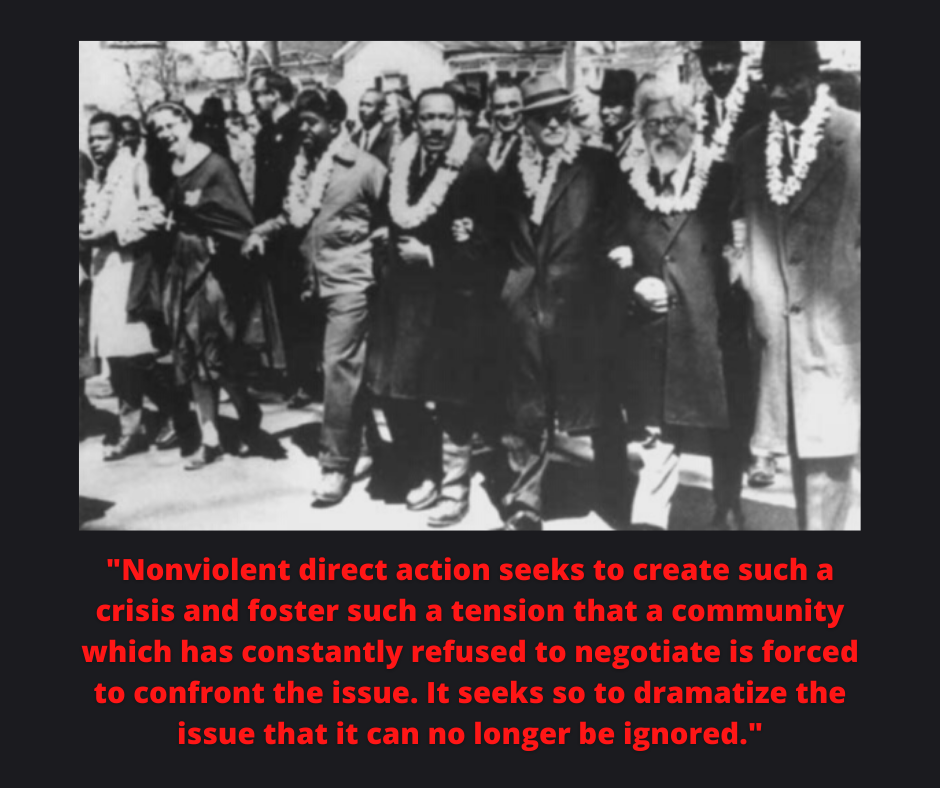|
Yesterday, Joseph Biden was inaugurated as the 46th President of the United States of America. To many Americans, this was a moment of immense relief: the authoritarian Donald Trump is finally out of the White House. And yet, many others on the left have already cautioned that a Democratic President is no guarantee for progressive, effective policies. Among Democrats, Biden is known for being a pushover for conservative policies and for being slow to adopt civil rights and other progressive legislation. Though there are recent signs of a progressive turn for Biden, we must not rest on our laurels yet. Indeed, our history shows that we must now work harder and smarter than ever.
The determination and momentum carried by Dr. King provide an excellent example. Martin Luther King, Jr. did not stop seeking equality when the Civil Rights Act was passed in 1964 (which outlawed segregation and other forms of discrimination), nor justice when the Voting Rights Act was passed in 1965 (which removed racist laws that prevented countless Black Americans from voting), but rather continued to aggressively interrogate the root causes of injustice, inequality, and suffering in the United States. Despite Democratic President Johnson’s stated wish to focus on the “war on poverty,” after 1965 LBJ found himself diverting more funds from his “Great Society” project into the actual war in Vietnam. Dr. King clearly saw that militarism consistently funnelled much needed resources from the poor, even when the liberal President devoted to fighting poverty was reluctant to do so. Thus, King’s vision of civil rights and social justice came to include all Americans, regardless of race, suffering under the inequality of modern capitalism. After segregation was outlawed, he started speaking of a “revolution” in an era when peoples around the world were violently struggling to assert their rights, dignity, and self-determination after decades, sometimes centuries of colonization. Social and liberation movements have always demonstrated their strength most effectively on the streets in mass actions. But, of course, Dr. King meant a nonviolent revolution, one in which the nonviolent means would be consistent with just ends, one that would require immense cooperation, discipline, and organization. Nonviolence is sometimes criticized for being too insular and for caring more about the individual’s moral egotism than about improving real lives in society, but Dr. King’s nonviolence was always rooted in mass action and tangible results: from the 1955-56 Montgomery Bus Boycott to the 1963 March on Washington to his last campaign, the 1968 Memphis Sanitation Workers Strike. As King wrote in his "Letter from a Birmingham Jail": "Nonviolent direct action seeks to create such a crisis and foster such a tension that a community which has constantly refused to negotiate is forced to confront the issue. It seeks so to dramatize the issue that it can no longer be ignored." Crucially, such action can force a community to confront the issue while still maintaining a certain moral legitimacy. Asking to consider legitimacy is not a call for respectability politics; it’s a call for practical strategic thinking. Donald Trump may be out of the White House, but the White supremacist / conspiracy theory movement he stirred can be found in communities all across this country. Their ideology is manifestly violent. But for every person who went to the Capitol to protest the election results on January 6, there were several more watching from home who had considered going but didn’t. With the authoritarian defeated but the threats to our society spread all across the country, now is our chance to frame the issues, expand our alliances, and inoculate our communities against such a movement. Source: King, Jr., Dr. Martin Luther. “Letter from Birmingham Jail.” 1963. https://letterfromjail.com/ Comments are closed.
|
AuthorWrite something about yourself. No need to be fancy, just an overview. Archives
March 2023
Categories |

 RSS Feed
RSS Feed